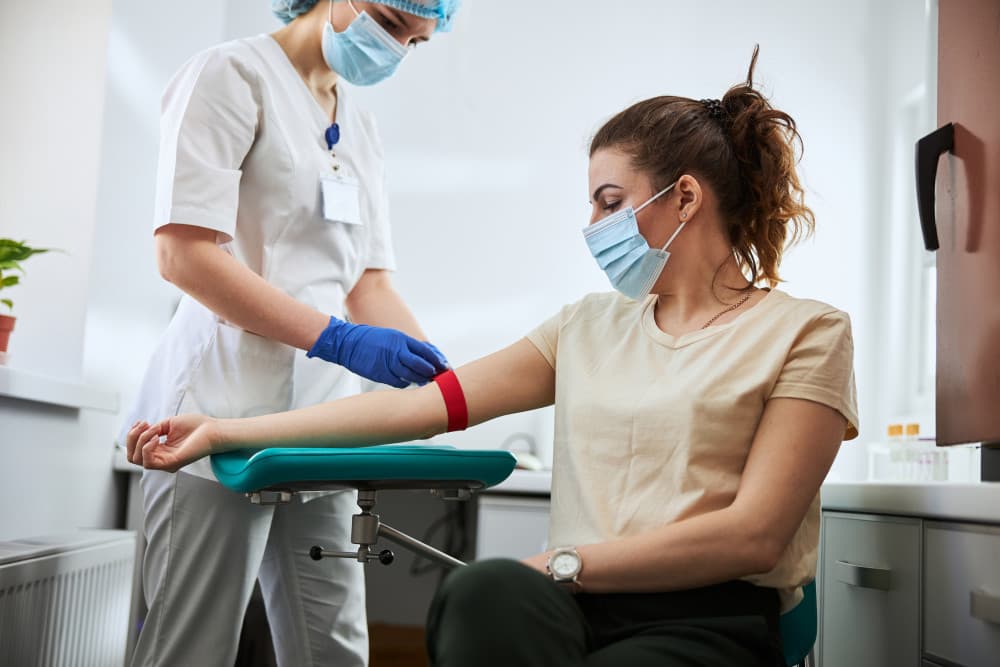The Importance of a Cancer Screening Test: A Key Strategy in Prevention and Early Detection

6 Minutes

Team Curative

Feb 26, 2024
Cancer has been documented in human history for thousands of years. Despite advancements in medical technology, cancer still has no cure and is the second-leading cause of death in the United States. In 2023 alone, there were nearly 610,000 US deaths from cancer. The best defense against cancer death is preventive care in the form of regular health screenings.
Simply put, cancer health screenings save lives. By the time symptoms develop, cancer may have progressed to an advanced stage or started to spread within the body. Early identification increases the likelihood of successful treatment and survival.
Cancer screening tests can detect cancer early before it grows or spreads. With roughly 1.9 million new cancer cases diagnosed in the United States in 2023, it is vital to prioritize cancer screening as a key part of your regular healthcare.
Here’s what you need to know to get the most out of your cancer screenings:
What are cancer screening tests?
As we reach certain age milestones, a health screening may be added as part of our routine healthcare visits. Cancer screenings are medical tests to detect cancer or precancerous conditions in people without symptoms. The goal of cancer screening is to identify cancer at an early stage when it is more treatable.
Common routine cancer screening tests include:
Breast cancer screening: a mammogram is a low-dose x-ray of the breast that can detect irregular masses within the tissue. It is a crucial tool for early detection as it can reveal irregularities such as tumors, cysts, or calcifications that may indicate the presence of cancerous cells.
Cervical cancer screening: a pap smear screens for cervical cancer by collecting cells from the cervix and examining them under a microscope for abnormalities. Additionally, a human papillomavirus (HPV) test is often performed alongside or as a follow-up to the pap smear to identify the presence of high-risk strains of HPV, a potentially cancer-causing viral infection.
Colorectal cancer screening: a colonoscopy examines the colon and rectum using a long, flexible tube containing a light and camera. The screening allows for a thorough examination of the colon’s inner lining, enabling the detection of swollen tissues, polyps, or cancer.
Lung cancer screening: low-dose computed tomography (CT) is a specialized x-ray that creates detailed cross-sectional images of the lungs. These scans can detect suspicious nodules or masses that may indicate the presence of lung cancer.
Prostate cancer screening: a prostate-specific antigen (PSA) test checks for prostate cancer by measuring PSA levels in the blood. Elevated PSA levels may indicate the presence of prostate cancer, prompting further diagnostic tests such as a prostate biopsy to confirm the diagnosis.
However,health screenings cannot detect all forms of cancer. Approximately 71% of all cancer deaths are caused by cancers that lack routine cancer health screening. New blood tests (such as the Galleri® screening test from GRAIL) look for a signal in the blood that could indicate the presence of cancer. When used with regular screening, these advancements greatly increase the chance of early cancer detection.
Prevention is key
Preventive care is essential to gaining control over your well-being and reducing the risk of future injury and disease. Setting up a health screening, especially one for cancer, can mitigate your risk of developing future health problems. Some providers may also recommend genetic testing to eligible patients to assess risk of developing cancer. Talk to your doctor (or your Curative Care Navigator) today to determine what cancer screening options are available to you.
The importance of cancer screenings are:
Advanced detection: some screening tests can identify precancerous conditions (such as lesions or polyps). In the early stages, cancer masses are often small and have not yet spread to other parts of the body. Advanced detection allows for better treatment planning.
Early intervention: identifying precancerous cells allows for preventive measures to reduce the risk of cancer development. Timely interventions for the early stages of cancer increase the likelihood of successful treatment and positive outcomes.
Cost-effective treatment: treating cancer at an early stage requires fewer invasive procedures and intensive therapies. Overall, these therapies and procedures are a less costly route than treating advanced-stage cancer.
Risk assessment: medical professionals often encourage people with specific risk factors, such as age, family history, or exposure to certain environmental factors, to seek regular monitoring. Cancer screening results may help to guide risk assessments for family members.
Regular preventive care can maintain and improve your quality of life. You can enjoy better physical and mental well-being and a more active and fulfilling life by addressing health issues early or preventing them altogether.

Does your health insurance cover cancer health screening?
Insurance coverage for cancer screening can vary depending on the type of insurance plan, the specific screening test, and the individual’s risk factors. However, health insurance plans often cover preventive services, including cancer screenings, as part of their commitment to promoting early detection and overall well-being.
For many, the idea of a cancer screening test seems daunting. High-deductible health insurance plans may not provide the necessary coverage to meet the recommended screening guidelines. In general, of those on high deductible health plans, 65% have opted to skip preventative care services due to confusion on coverage and uncertainty regarding affordability.
Comprehensive insurance plans, such as the Curative health plan, provide greater peace of mind by providing extensive health screening coverage options. Members of Curative health insurance plans can rest easy knowing they will have access to the latest cancer screening options with no out-of-pocket costs*.
Curative Care Navigators are here to support you through your preventive health screening journey by connecting you to the right in-network healthcare providers and guiding you through the cancer screening process. Curative can create a preventive care strategy to ensure you receive routine health services and recommended screenings. Care Navigators make it easy to be a healthier you.
Galleri® redefines cancer screening
Curative is proud to offer eligible members and dependents access to GRAIL's innovative Galleri multi-cancer early detection test.
Through a simple blood draw, Galleri tests for over 50 types of cancer by detecting a signal shared by multiple cancer types. When used with recommended screenings, Galleri improves the chances of detecting cancer early.
Traditional screening practices only look for five main cancer types: breast, colorectal, lung, cervical, and prostate. Galleri is an additional tool to screen for many cancers, including those that lack screening tests - giving members the confidence to know they've done more. In a clinical study, Galleri approximately doubled the number of cancers detected with recommended screening.
The Galleri screening test is available to active Curative plan members who have completed their Baseline Visit, are 50 or older, not currently pregnant, and not undergoing active cancer treatment. For more information, visit our Galleri landing page.
Please review Important Safety Information about the Galleri test.
Curative simplifies health insurance
Curative is a new kind of employer-sponsored health insurance that provides comprehensive healthcare while prioritizing affordability, engagement, and simplicity.
No copays. No deductibles. No...really. Curative is changing the way we view health insurance.
Learn more about how Curative can help you with all of your health screening needs by visiting our website today.
To see all disclaimers, please view here.
References
Blood test for cancer screening: Galleri®. Galleri® Test. https://www.galleri.com/
Cancer facts & figures 2023. American Cancer Society.
Centers for Disease Control and Prevention. (2024, January 17). FASTSTATS - leading causes
of death. Centers for Disease Control and Prevention. https://www.cdc.gov/nchs/fastats/leading-causes-of-death.htm
Centers for Disease Control and Prevention. (2024, February 12). How to Prevent Cancer or Find it Early: Screening Tests. Centers for Disease Control and Prevention. https://www.cdc.gov/cancer/dcpc/prevention/screening.htm
Guardian News and Media. (2020, December 1). The guardian view on a new test for cancer:
Grounds for optimism | editorial. The Guardian.
US Preventive Services Task Force. US Preventive Service Recommendations.
https://www.uspreventiveservicestaskforce.org/uspstf/topic_search_results
The way we approach cancer is about to change forever. STAT. (2021, June 4).
https://www.statnews.com/sponsor/2021/05/04/the-way-we-approach-cancer-is-about-to-change-forever/
Sign up for our Newsletter
Table of Contents
What are cancer screening tests?
Prevention is key
Does your health insurance cover cancer health screening?
Galleri® redefines cancer screening
Curative simplifies health insurance








